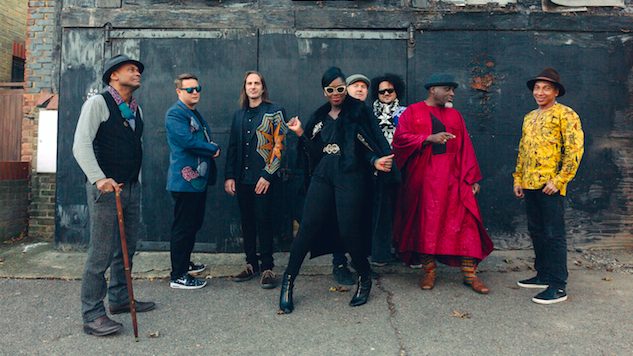Ibibio Sound Machine: The Best of What’s Next
Photo by Dan Wilton Music Features Ibibio Sound Machine
At a time when hostile, nationalist rhetoric dominates the political conversation, Ibibio Sound Machine’s cross-pollination of international influences feels refreshingly organic — even radical. The band’s sophomore release Uyai (out now on Merge Records), isn’t necessarily political, but with its luminous synths and ecstatic rhythms, it presents a utopian vision of pop without borders.
But for the band members, the fact that Ibibio Sound Machine is a cultural melting pot isn’t a big deal — it’s just natural. “London is such a cosmopolitan place,” said bandleader Eno Williams with a slight smile and a shrug during a recent Skype interview. “There’s so much talent.”
Williams was born in London but spent most of her childhood and adolescence in Nigeria, where her family is from. And Ibibio Sound Machine’s seven other members hail from four different continents: Guitarist Alfred Kari Bannerman is Ghanaian; producer and saxophonist Max Grunhard is Australian; percussionist Anselmo Netto is Brazilian; and drummer Jose Joyette is Trinidadian. Bassist John McKenzie, trumpet and synth player Scott Baylis, and trombone and synth player Tony Hayden are all British.
All of these influences come into play in the band’s celebratory, percussive pop — a well-executed balancing act of West African drumming, lyrics based on traditional Ibibio storytelling, and upbeat electronics that call to mind M.I.A., Santigold, and even Devo.
Ibibio Sound Machine’s hybridized sound falls in line with a rising wave of artists with immigrant backgrounds who draw from their heritages to create thoughtful, forward-thinking work (as well as black artists making connections among different cultures of the African diaspora). But there’s a fundamental difference in the way Williams and her bandmates mix these influences, from the familiar practice of Western artists who adopt the styles of cultures they admire but don’t necessarily belong to — like Diplo with baile funk or Thievery Corporation with bossa nova.
“Max, Tony, and Scott are all jazz guys,” said Williams. “Alfred, who’s from Ghana, has that Ghanaian highlife influence. Of course, Anselmo, our percussionist, comes from Brazil so he brings that Brazilian, Cuban, West African flare to it. I guess that’s what makes the whole mixture quite unique.”
Growing up in Nigeria, Williams absorbed a huge variety of music: the joyful rhythms of highlife — a Ghanaian genre that became popular in Nigeria in the ’70s — as well as funk, soul, and pop artists like James Brown, Aretha Franklin, Whitney Houston, and The Beatles. Like Houston and Franklin, Williams cut her teeth as a singer in a gospel choir while still living in Nigeria. But when she returned to London as a university student, she started experimenting with singing pop music in both English and Ibibio, her ancestral language.
When Grunhard heard Williams sing in Ibibio during a studio session, he invited her to collaborate. “I remember talking about Ibibio storytelling and just singing a few lines,” she said. “[Max] got really captivated and thought it was quite musical and really rhythmic. Then we kind of toyed with the idea of doing something in Ibibio, and one song led to two songs and then three songs.”
“Uyai” means beauty in Ibibio. And on the new album, Williams creates gorgeous shapes with Ibibio’s rounded vowels and muted consonants, which are melodic in comparison to the English language’s relatively staccato cadence. Uyai climbs to exhilarating emotional highs — as with the chant-like, percussive earworm “The Pot Is On Fire” — but there are somber moments too, like with the downcast guitars and hushed vocals on “Quiet.”
Many of the band’s lyrics are based on Ibibio folktales and legends. “For example, we’ve got ‘Sunray,’” said Williams. “It’s a story about how powerful the sun is. People wake up and the sun brings a newness of life.”
On the band’s first, self-titled album from 2014, Williams based all of her lyrics on traditional Ibibio storytelling. But with Uyai, she felt compelled to branch out and address contemporary issues, as well. For instance, “Give Me a Reason,” Uyai’s high-energy lead single, is about the 276 school girls that Boko Haram kidnapped in 2014. Williams explained that its danceable sound — which might come across as an unexpected contrast to the subject matter — was a call for and celebration of freedom.
“We’re all about spreading the positive vibes and reminding people of freedom and why we should be free to be who or what we want to be — and give a shout out to these girls as well,” she said. “It’s not to dampen the moment, but to bring that hope that we can be free.”
So far, Ibibio Sound Machine hasn’t played on the African continent (though that’s in the works), so I asked Williams what it was like playing for audiences that often don’t have much familiarity with her culture or language. She explained that music transcends those cultural differences, and Ibibio Sound Machine’s shows are certainly testament to that. Even in European countries one would think are more conservative (Williams singles out a performance in Iceland in particular), the band’s performances have erupted into enthusiastic dance parties.
“I think music is just so universal,” she smiled. “And in some cases, people don’t understand what you’re singing about, but they just get into it.”